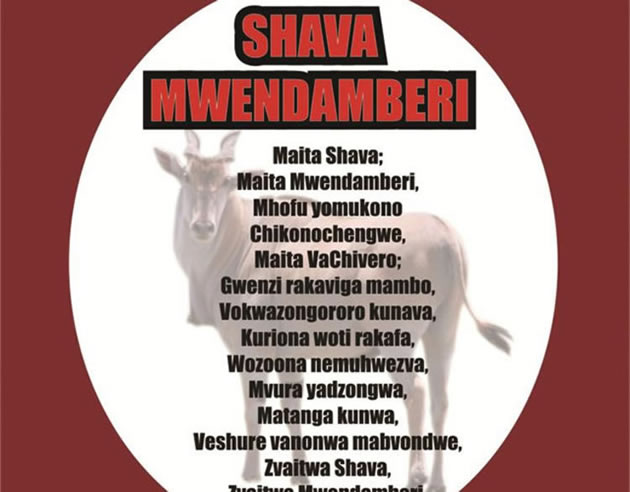The silent gaps in our history

 Sekai Nzenza On Wednesday
Sekai Nzenza On Wednesday
“I do not have a totem,” said the smart-looking student wearing a white T-shirt, white athletic shoes and carrying a grey back pack. “But I thought we all had totems,” said the other shorter student in a pink shirt.
“When you are in Christ, you have no history, no totem, you are a new person,” says the one in the white T-shirt.
We are standing in front of the ATM machine in Avondale, Harare. One of the students is withdrawing money and I am waiting for my turn when this conversation starts.
I decide to join in the conversation, even though I do not know the students and I am not invited into the conversation.
“So, if you have no totem, no history, no past, do you have any ancestors at all?” I ask.
“You see, aunt, the Bible says, when Christ sets you free, you will be free indeed,” says the young man in a white T-shirt. He goes on to tell me that our ancestors were not Christians and they died in sin. I have heard this before during my days at mission boarding schools. We have a gentle argument. The other friend who has just collected money from the machine joins in the discussion. Unlike his friend in a white T-shirt, this one has a totem and he is very proud to call himself Nzou the Elephant.
“Being a Nzou will not get you to heaven,” says the friend in the white T-shirt.
My cousin Reuben, the one who lives in Australia, joins us at the ATM.
He is carrying plastic bags full of African artefacts, the type tourists buy when they come to Zimbabwe.
I notice that Reuben is wearing a new brown necklace made from the fruits of a village tree.
Men should not wear that. But when people have lived overseas for too long, they sometimes see art where we do not see it.
A man Reuben’s age should not be wearing a silly feminine necklace like that. He is also wearing a new Rastafarian bracelet.
The students greet Reuben politely. “This young brother of yours here, born and brought up in Zimbabwe, says he has no history and no totem,” I tell Reuben. The other student looks at Reuben bemused.
Reuben quickly launches into a lecture on the importance of knowing who you are and where you came from. He says there was a time soon after independence when we fought and rejected some missionary beliefs. We resisted learning more about European history and reclaimed our own. “You must not take the American way of worship as it is.
“Learn to question it when some new waves of evangelism tell you that you have no totem, no history,” Reuben tells them. I stand there nodding, thinking, ‘tell them brother, tell them’.
Reuben should have remained a teacher before he chose to migrate to Australia. Then he gives the young men a lesson on American Thanksgiving and how Americans gather together during the last week of November to celebrate Thanksgiving by eating massive quantities of turkey and deserts. Reuben says some Americans will be praying hard to thank God for taking the country away from the Native Americans. Others will be drinking and remembering their ancestors.
The Americans thank God for giving them an American history, an American identity, even if that history is tainted with the killing of Native Americans or Red Indians and the atrocities of the Trans-Atlantic slave trade.
“They will stand up tall and say ‘thank God I am an American’ even if their history has some bad incidents. They know that part of their history. They know their ancestors. And yet, when it comes back to us Africans in Zimbabwe, we have very little knowledge of who we are beyond our parents and grandparents. What happened?” Reuben says, looking a little exasperated.
The student in a white T-shirt then interrupts him. “Mukoma, where I grew up in Mufakose, my parents said they used to live in the village. Then the liberation war came and they never returned back there. Now most of the people over there are dead. I do not know of any past history beyond that of my parents.”
“Wow, what do you say to that Sis?” Reuben asks me. The students are late for wherever they are going.
Extra university lessons, perhaps. Like well brought up Christian boys, the students shake hands with us and politely say it was nice to meet and talk about subjects of interest like our history.
“A person with no totem, hey?” Reuben says. “You know Sis, those students only discover more about themselves as they grow older or when they live this country to go into the Diaspora. Once you get there, you realise that you know very little about your past. A lot happened to our people that we still do not know about,” says Reuben.
We sit down for coffee in a cafe. He shows me a medium-sized stone sculpture of Mhofu, the Eland, and the symbol of our totem. He places it on the coffee table, strokes and admires it.
“This big dad here is going to travel with me back to Australia. I will place him on the mantel piece in my house. Everyone who comes in will say, ‘Greetings Mhofu the Eland’.”
Reuben pats the sculpture, kisses it and places it gently in his back pack.
For the first 10 or so years during his stay in Australia, Reuben was one of those Diaspora people who hardly came back home. He paid little attention to anything African, Zimbabwean or Shona.
But, of late, he has started coming back home once, sometimes twice per year.
He says life outside Zimbabwe has taught him to reconnect with his past. Sometimes, that past is hard to find because there is nothing written.
When we were growing up in the village, there was silence about the past.
We were told nothing of the wars between the British and the Africans in Zimbabwe. Silence was part of the Rhodesian government policy. The elders said nothing. There was nothing written. At school, the gaps of silence were filled in by the missionaries. They said we were living in darkness until the Europeans brought the light of civilisation. And we believed everything they said.
Post-independence, we did not talk about history again for fear that this would bring up the pain of the past and reignite racism.
And yet, the history is there, glaring at us, wanting to be told if we dig a little deeper. On my mother’s side, I claim to be one of the great-grand-children of Chingaira, the great Makoni chief who resisted the British at Mount Mhanda, in Maungwe, near present day Rusape. Chingaira was beheaded on September 4, 1896 by an Englishman called Watts who took the head to England for display. The head is still there.
My mother’s totem is of the Makoni Chingaira clan, those of the Buffalo or Nyati people.
After the murder of Chingaira, some of the Makoni clan elders were forced to disperse.
They travelled south east and crossed the Save river. Among them were four brothers whose names were Mandizha, Chawatama, Sengwe and Ndawana.
They settled in what is now Buhera and Chikomba. The story goes that my great-great-grandfather, Mandizha, then killed a lion in a cave and that is why his name became Bako, meaning the cave. So, my mother’s maiden name is often interchanged with Mandizha or Bako, of the Makoni Chingaira dynasty. Those two names represent my history, going back to the time before Chingaira’s head became a trophy in a British museum.
There was silence about that Chingaira past. The only time Chingaira was mentioned was when my mother accidentally dropped something or when she was very angry about something. She would then shout, “NaChingaira wakachekwa neMakiwa,” meaning, ‘I swear by Chingaira who was beheaded by the British’.
Years later, I discovered that exclamation was a way of keeping history alive and subverting government policy that required silence on the events of the past that might have inspired Africans to fight back.
Post-independence, we did not talk about the depth, truth and complexities of our real history. Perhaps we feared that this would bring up the pain of the past and reignite racism.
Many years later, some of the evangelical Christian churches, mostly from America, are presenting a world with no totems, no past, no history, just Christ and the glory of heaven when we die.
Now my cousin Reuben is back home from Australia and of late, he is totally obsessed with history.
Who are we, where did we come from?
You see him around the village, with his camera, taking videos and interviewing old people. But there are not so many old people left in our village.
We are a people with a long history and a long family tree. But we do not know the absent relatives on the family tree. When you visit the old village compound now, you will find nothing, except some old bricks and broken clay pots. How do we recreate and fill the gaps of silence in our history? Surely, it is not too late to mend the broken clay pots and speak of a past that is still so close.
- Dr Sekai Nzenza is an independent writer and cultural critic.










Comments